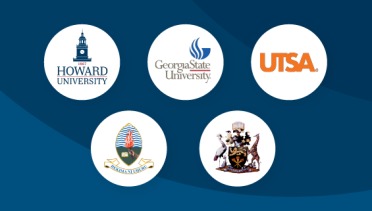American Institutes for Research Expands Effort to Diversify the Social and Behavioral Science Fields into East Africa
Pipeline Partnership Program to support students and faculty at universities in Kenya and Tanzania
Arlington, Va. - The American Institutes for Research (AIR) is expanding its initiative to diversify the social and behavioral science fields through partnerships with two universities in East Africa—the University of Nairobi in Kenya and the University of Dar es Salaam in Tanzania. The two universities will join AIR’s Pipeline Partnership Program, which provides guidance, mentoring and learning opportunities for the next generation of research and technical assistance professionals.

The Pipeline Partnership Program launched in 2020 with three U.S. universities–Howard University in Washington, D.C.; the University of Texas at San Antonio; and Georgia State University in Atlanta. The program is funded by the AIR Equity Initiative, the institution’s five-year, $105 million investment in research, technical assistance and partnerships to address the underlying causes of systemic inequities and increase opportunities for people and communities. The program is an extension of AIR’s commitment to diversity, equity and inclusion (DEI).
“Increasing the diversity and cultural competency of those who conduct research and provide technical assistance is crucial to the future of our field and ensuring that the work we do is relevant, accurate and inclusive,” said David Myers, chief executive officer for AIR. “Working with the University of Nairobi and the University of Dar es Salaam, the Pipeline Partnership Program will allow young researchers to learn from and collaborate with experts in the field and will support our mission of generating and using rigorous evidence that contributes to a better, more equitable world.”
“Our DEI journey is both an internal and external effort to increase the cultural competency of our staff and the field, so we can better inform policy and decision making,” said Karen Francis, AIR vice president and chief DEI officer. “We are excited to grow the Pipeline Partnership Program into East Africa to help guide the next generation of social and behavioral scientists and improve lives around the globe.”
The program will offer linguistically and culturally competent training and professional development opportunities for graduate students in economics at the two universities through webinars and targeted short training courses in areas such as survey methodology, impact evaluation and longitudinal data analysis. Some senior graduate students at each institution will be paired with mentors to expand their professional networks and receive technical support in their research activities.
Graduate students can also join AIR project teams in the International Development division as paid interns to gain hands-on experience in applied policy research. A parallel program geared toward junior faculty at universities across Africa will enable them to join AIR project teams as researchers to enhance their skills in all stages of the research project cycle, preparing them to lead their own projects.
The University of Nairobi and the University of Dar es Salaam are the flagship universities in the national system of tertiary education in their respective countries.
“This is a wonderful opportunity for our students to connect with a wider group of scholars from around the world in order to broaden their networks and gain exposure to professional opportunities,” said Beatrice Mkenda, dean of the School of Economics at the University of Dar es Salaam. “It is difficult for African students to gain access to international networks, which are critical for learning about career opportunities.”
“This is a welcome initiative by AIR to support our graduate students,” said Martine Oleche, chair of the Department of Economics and Development Studies at the University of Nairobi. “The opportunity to engage with AIR project teams will be especially beneficial, to learn first-hand how to conduct applied research and connect with relevant policies. We are extremely excited about the impact this can have on our students.”
For more information about the partnership, contact Ashu Handa, AIR Institute Fellow; Martine Oleche, at the University of Nairobi; or Stephen Kirama, at the University of Dar Es Salaam. Media inquiries should be directed to Dana Tofig at AIR.
About AIR
Established in 1946, the American Institutes for Research® (AIR®) is a nonpartisan, not-for-profit organization that conducts behavioral and social science research and delivers technical assistance to solve some of the most urgent challenges in the U.S. and around the world. We advance evidence in the areas of education, health, the workforce, human services and international development to create a better, more equitable world. For more information, visit www.air.org.